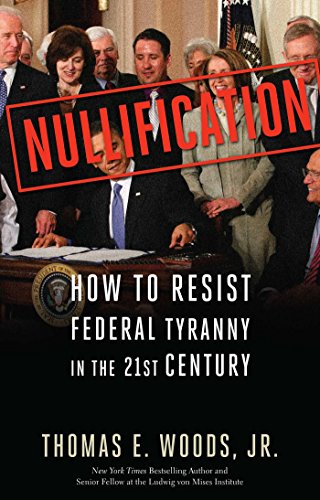Recently by Thomas E. Woods, Jr.: The Right To Nullify This Government
When I appeared before hundreds of members of the Iowa GOP late last June on the eve of the state party convention and received a standing ovation from throngs of party loyalists, I knew the business-as-usual crowd would be annoyed. I had just finished explaining that if we are serious about limiting government, as opposed to giving pretty speeches and wringing our hands, we will have to make use of all the mechanisms of defense Thomas Jefferson bequeathed to the states, and not just the ones that don’t offend Katie Couric or the New York Times.
Nathan Tucker has fired the inevitable shot back, in the form of a more or less predictable review of my book Nullification: How to Resist Federal Tyranny in the 21st Century. I urge you, dear reader, to download a free chapter of the book at NullificationFreeChapter.com, and see if it intrigues you. Mr. Tucker, I am sorry to report, is not intrigued.
Jefferson’s argument is stated simply enough. If the federal government is allowed to hold a monopoly on determining the extent of its own powers, we have no right to be surprised when it keeps discovering new ones. If the federal government has the exclusive right to judge the extent of its own powers, it will continue to grow — regardless of elections, the separation of powers, and other much-touted limits on government power. In his famous Report of 1800, James Madison reminded Virginians and Americans at large that the judicial branch was not infallible, and that some remedy must be found for those cases in which all three branches of the federal government exceed their constitutional limits.
 Nullification: How to ...
Best Price: $2.00
Buy New $8.34
(as of 05:25 UTC - Details)
Nullification: How to ...
Best Price: $2.00
Buy New $8.34
(as of 05:25 UTC - Details)
I argue, along with Jefferson and his long and honorable pedigree, that the states created the federal government, which they obviously did, and that as a principal to the federal compact each state reserves the right — if I may quote Jefferson himself — to “judge for itself, as well of infractions [of the Constitution] as of the mode and measure of redress.” Otherwise, the federal government will expand without limit.
Tucker responds by claiming, incredibly, that all states after the original thirteen were created by the federal government. I am quite certain he has no idea the extent of his blunder. He is advancing the very Old World view of the nature of the state and the people that Americans fled Europe to escape. The American position has always been that an American state is created by the people, not the federal government. Jefferson himself amplified this point in the controversy over the admission of Missouri. The people of Missouri had drafted a constitution and were applying for admission to the Union. Were they not admitted, Jefferson told them, they would be an independent state. In other words, their statehood derived from their sovereign people and its drafting of a constitution, not the approval of the federal government.
 American Empire Before...
Best Price: $1.70
Buy New $6.61
(as of 02:50 UTC - Details)
American Empire Before...
Best Price: $1.70
Buy New $6.61
(as of 02:50 UTC - Details)
Nullification isn’t constitutional, Tucker rushes to assure everyone, since he doesn’t see it mentioned anywhere in the U.S. Constitution itself. But that’s the thing about the powers of the states: they don’t have to be mentioned explicitly. Only the powers of the federal government (as well as the restrictions on the states) are to be specifically enumerated. That’s the nature of a limited, federal system. And as I show in the book, the power of nullification was indeed assured to the people at the state ratifying convention of Virginia, the state from which so many of our most important statesmen and thinkers hailed. Add to this the obvious, commonsense point that a federal government allowed to have a monopoly on determining its own powers will continuously discover new ones, which happens to be precisely what has occurred, and you have a logically unassailable case for state nullification. (For that matter, where in the Constitution is the federal government granted the exclusive, monopoly power to judge its own powers infallibly? Assigning certain kinds of cases to the Supreme Court is not the same thing, and the Supremacy Clause, as I show in the book, merely begs the question.)
 CHURCH & THE MARKET (S...
Best Price: $6.04
Buy New $101.04
(as of 04:20 UTC - Details)
CHURCH & THE MARKET (S...
Best Price: $6.04
Buy New $101.04
(as of 04:20 UTC - Details)
I am not going to repeat my defense of the compact theory of the Union, which you can find in chapter 4 of my book, and which is in no way undermined by Tucker’s criticisms. It is the only coherent theory of the Union, and indeed no systematic alternative appeared until Joseph Story’s Commentaries in the 1830s. In fact, even the states that objected to the Virginia and Kentucky Resolutions of 1798 by and large accepted the compact theory of the Union.
One correction, though: Tucker thinks the fact that some territories have been divided in the past presents a problem for my statement that sovereignty cannot be divided or alienated. But sovereignty is not territory. A sovereign people can freely choose to divest itself of some of its territory. Indeed if it could not do so it would not be sovereign.
On to more practical matters. Some of us are a little tired of electing do-nothing plastic men who intensify our fiscal problems, and then hope the rubes fall for their pretty talk about limited government. We’re also impatient with the equally failed strategy of waiting for the federal government’s own courts to roll it back — a foolish approach Jefferson viewed with contempt, since he knew the federal courts would simply rubber-stamp federal usurpations. Forgive me if I remain unconvinced that the best strategy for rolling back government is to wait for a good Supreme Court, perhaps in the year 2874, or to keep writing to my bought-and-paid-for congressman. Nothing would please the New York Times more than for us to stick to our failed strategies and forget all about nullification. I, on the other hand, and many others like me, prefer not to give the Times and Keith Olbermann the satisfaction.
And incidentally, the rest of the country is already doing it. Two-dozen states nullified the REAL ID Act of 2005, and the federal government had to back down. California persisted in its medical marijuana policy after the Supreme Court said to cut it out. (Alabama, Mississippi, and Louisiana wrote amicus briefs in support of California, by the way, since even though those states disagreed with its policy, they also believed in the Tenth Amendment to the Constitution.) Several states have already nullified various federal gun regulations. Cap-and-trade nullification is being drafted as we speak. And much more. If enough people and enough states are prepared to say no, we will win.
 The Politically Incorr...
Best Price: $1.51
Buy New $8.71
(as of 06:15 UTC - Details)
The Politically Incorr...
Best Price: $1.51
Buy New $8.71
(as of 06:15 UTC - Details)
If Tucker had his way, on the other hand, Iowa would have nothing to do with any of this. While other states are finally — finally! — beginning to push back against the federal government, he would confine Iowans to the most unsuccessful strategy in the history of the world.
I am disappointed that Nathan Tucker doesn’t like Nullification, but consoled that on the back cover you’ll find former congressman Barry Goldwater Jr. (son of the legendary Arizona senator), Rush Limbaugh sit-in host Walter Williams, and FOX News Senior Judicial Analyst Judge Andrew Napolitano. Take your pick, Iowa: these men, or Nathan Tucker?
If the states do not function as the sentinels of the people’s liberty, the results are all too predictable. We live with those results every day. What we need is to establish a new modus vivendi between the federal government and the states, along the lines Thomas Jefferson envisioned. That is what those of us who support the Jeffersonian remedy of nullification are seeking to establish.
The time has come to make a decision. Are we happy with the progress we’ve made against the expansion of federal power over the past several generations? If so, we shouldn’t change a thing. But if we’re tired of the betrayals, the failures, and the sloganeering automatons we’re told to choose from, we’ll need the courage and the common sense to try something new. Or, in this case, something old and venerable, from the mind of Thomas Jefferson himself.
Nathan Tucker has made his choice. I have made mine. But what happens next is up to you.
Reprinted from the Iowa Republican with permission.





